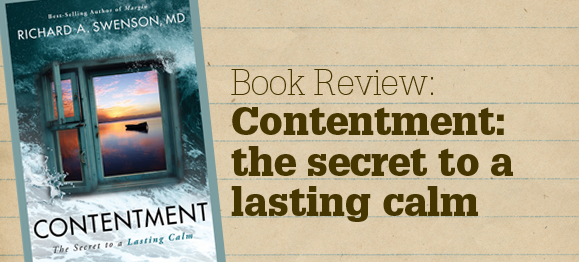
Richard Swenson is becoming one of my favorite authors. Earlier I read his books Margin and Balance and was anticipating his new book, released just this year, Contentment: The Secret to a Lasting Calm. I read it this summer and was not disappointed.
As a medical doctor, Swenson’s trademark in his writing is to make his recommendations as Rx prescriptions. This makes his books very practical and applicable—both of which I appreciate.
For example, here are twelve points from his chapter “Learning Contentment” (followed by a summary sentence, each point has multiple paragraphs in the book):
12 Prescriptions to Learn Contentment:
- Learn through intentionality. Learning contentment requires effort; be willing to pay the price.
- Learn through experiences. Life experiences are wonderful teachers if we know how to pay attention.
- Learn by being in the presence of God. If our lives are too busy to sit at the feet of Jesus, we will not learn contentment.
- Learn through patient submission to Christ. Some troubles of life we can and should avoid, but contentment recognizes that everything beyond our control lies within God’s sovereignty.
- Learn by moderating our desires. Desiring less increases our satisfaction.
- Learn by adjusting our hearts. We must set our affections on things above.
- Learn by daily choices. By repeatedly choosing contentment, we train our wills to want what God wants for us.
- Learn through patience. Waiting on God is one of the best ways to develop contentment in Him.
- Cultivate inner contentment. We often can’t control our environments, but we can control where we look during adverse circumstances. Finding our sufficiency in Christ is an expression of contentment.
- Don’t look back. “If only” and “what if” are two of the worst contentment killers.
- Place our relationship with Christ above our relationship with things. Friendship with the world is false and foolish, but friendship with God is satisfying and eternal.
- Accept God’s providence over our preference. Contentment is our glad submission wrapped in God’s providence.
The chapter “Jesus and Contentment” was a special blessing to me as it reminded me of the simplicity of our Saviour’s life. Swenson also spoke of what it means to be godly with contentment—specifically in understanding the importance of spiritual wealth.
Swenson’s writing has a way of encouraging me to simplify my schedule and quest for the trivial. I greatly benefited from this book, and I look forward to reading it again.



